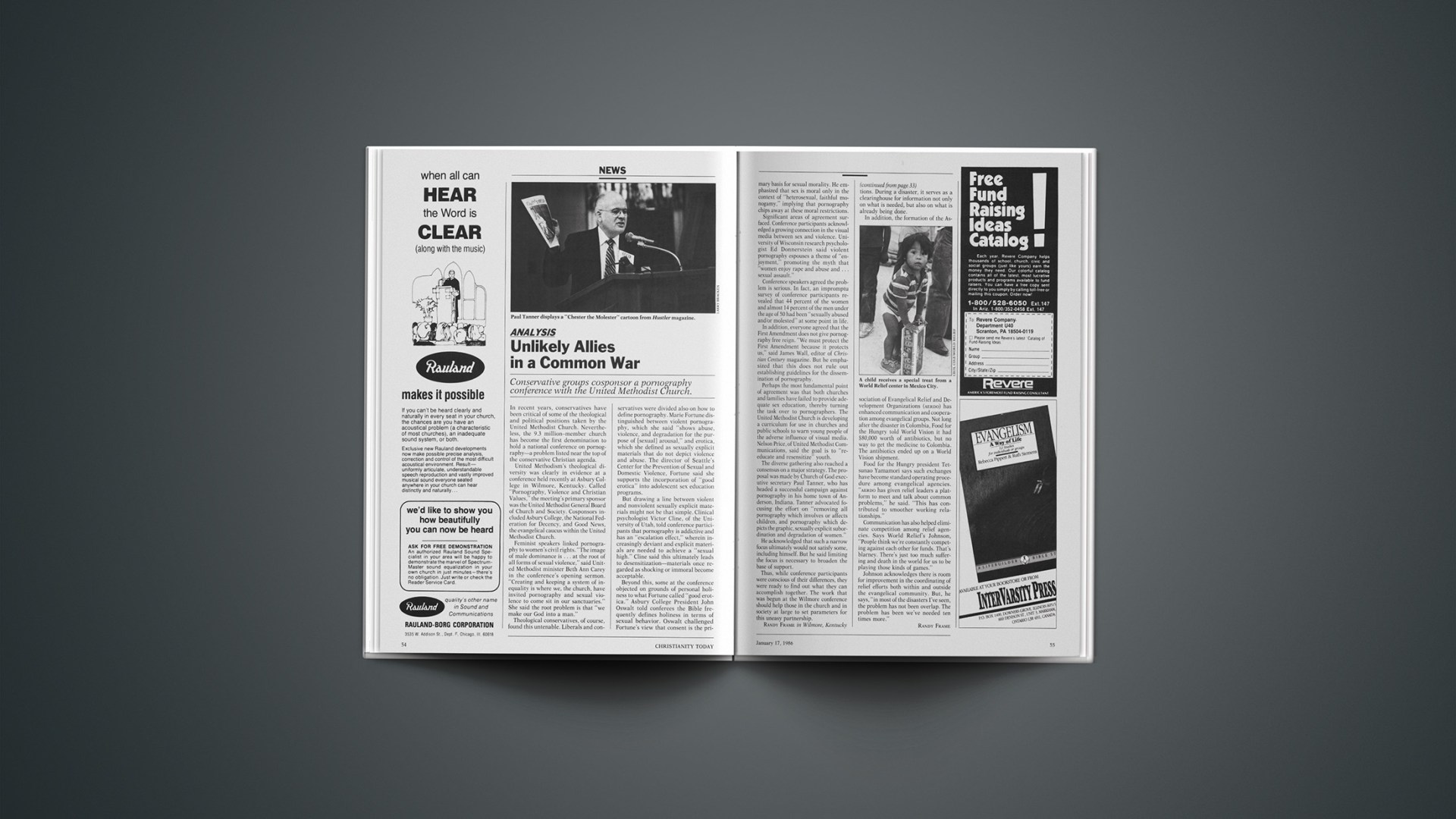Conservative groups cosponsor a pornography conference with the United Methodist Church.
In recent years, conservatives have been critical of some of the theological and political positions taken by the United Methodist Church. Nevertheless, the 9.3 million-member church has become the first denomination to hold a national conference on pornography—a problem listed near the top of the conservative Christian agenda.
United Methodism’s theological diversity was clearly in evidence at a conference held recently at Asbury College in Wilmore, Kentucky. Called “Pornography, Violence and Christian Values,” the meeting’s primary sponsor was the United Methodist General Board of Church and Society. Cosponsors included Asbury College, the National Federation for Decency, and Good News, the evangelical caucus within the United Methodist Church.
Feminist speakers linked pornography to women’s civil rights. “The image of male dominance is … at the root of all forms of sexual violence,” said United Methodist minister Beth Ann Carey in the conference’s opening sermon. “Creating and keeping a system of inequality is where we, the church, have invited pornography and sexual violence to come sit in our sanctuaries.” She said the root problem is that “we make our God into a man.”
Theological conservatives, of course, found this untenable. Liberals and conservatives were divided also on how to define pornography. Marie Fortune distinguished between violent pornography, which she said “shows abuse, violence, and degradation for the purpose of [sexual] arousal,” and erotica, which she defined as sexually explicit materials that do not depict violence and abuse. The director of Seattle’s Center for the Prevention of Sexual and Domestic Violence, Fortune said she supports the incorporation of “good erotica” into adolescent sex education programs.
But drawing a line between violent and nonviolent sexually explicit materials might not be that simple. Clinical psychologist Victor Cline, of the University of Utah, told conference participants that pornography is addictive and has an “escalation effect,” wherein increasingly deviant and explicit materials are needed to achieve a “sexual high.” Cline said this ultimately leads to desensitization—materials once regarded as shocking or immoral become acceptable.
Beyond this, some at the conference objected on grounds of personal holiness to what Fortune called “good erotica.” Asbury College President John Oswalt told conferees the Bible frequently defines holiness in terms of sexual behavior. Oswalt challenged Fortune’s view that consent is the primary basis for sexual morality. He emphasized that sex is moral only in the context of “heterosexual, faithful monogamy,” implying that pornography chips away at these moral restrictions.
Significant areas of agreement surfaced. Conference participants acknowledged a growing connection in the visual media between sex and violence. University of Wisconsin research psychologist Ed Donnerstein said violent pornography espouses a theme of “enjoyment,” promoting the myth that “women enjoy rape and abuse and … sexual assault.”
Conference speakers agreed the problem is serious. In fact, an impromptu survey of conference participants revealed that 44 percent of the women and almost 14 percent of the men under the age of 50 had been “sexually abused and/or molested” at some point in life.
In addition, everyone agreed that the First Amendment does not give pornography free reign. “We must protect the First Amendment because it protects us,” said James Wall, editor of Christian Century magazine. But he emphasized that this does not rule out establishing guidelines for the dissemination of pornography.
Perhaps the most fundamental point of agreement was that both churches and families have failed to provide adequate sex education, thereby turning the task over to pornographers. The United Methodist Church is developing a curriculum for use in churches and public schools to warn young people of the adverse influence of visual media. Nelson Price, of United Methodist Communications, said the goal is to “reeducate and resensitize” youth.
The diverse gathering also reached a consensus on a major strategy. The proposal was made by Church of God executive secretary Paul Tanner, who has headed a successful campaign against pornography in his home town of Anderson, Indiana. Tanner advocated focusing the effort on “removing all pornography which involves or affects children, and pornography which depicts the graphic, sexually explicit subordination and degradation of women.”
He acknowledged that such a narrow focus ultimately would not satisfy some, including himself. But he said limiting the focus is necessary to broaden the base of support.
Thus, while conference participants were conscious of their differences, they were ready to find out what they can accomplish together. The work that was begun at the Wilmore conference should help those in the church and in society at large to set parameters for this uneasy partnership.
RANDY FRAMEin Wilmore, Kentucky










